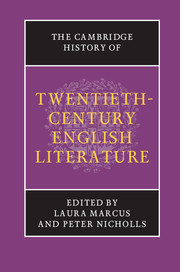Book contents
- Frontmatter
- Introduction
- PART ONE WRITING MODERNITY
- 1 Science and knowledge at the beginning of the twentieth century: versions of the modern Enlightenment
- 2 The Victorian fin de siècle and Decadence
- 3 Empire and modern writing
- 4 The gender of modernity
- PART TWO THE EMERGING AVANT-GARDE
- PART THREE MODERNISM AND ITS AFTERMATH, 1918–1945
- PART FOUR POST-WAR CULTURES, 1945–1970
- PART FIVE TOWARDS THE MILLENNIUM, 1970–2000
- Bibliography
- Index
- References
3 - Empire and modern writing
from PART ONE - WRITING MODERNITY
Published online by Cambridge University Press: 28 March 2008
- Frontmatter
- Introduction
- PART ONE WRITING MODERNITY
- 1 Science and knowledge at the beginning of the twentieth century: versions of the modern Enlightenment
- 2 The Victorian fin de siècle and Decadence
- 3 Empire and modern writing
- 4 The gender of modernity
- PART TWO THE EMERGING AVANT-GARDE
- PART THREE MODERNISM AND ITS AFTERMATH, 1918–1945
- PART FOUR POST-WAR CULTURES, 1945–1970
- PART FIVE TOWARDS THE MILLENNIUM, 1970–2000
- Bibliography
- Index
- References
Summary
The Indian-born Rudyard Kipling (1865–1936), who throughout his career wrote from a sense of being un-English and ‘unhomely’, although himself a writer in English, was one of the first openly to recognise that British culture and literature were shot through and through with the experience and the perceptions of empire. This chapter, ‘Empire and Modern Writing’, aims to expand on some of the implications of Kipling’s thought. It will suggest that understanding British society at the turn of the nineteenth into the twentieth century in all its fissiparous uncertainty, its fears of degeneration coupled with its convictions of cultural superiority, entails placing that society inside the complicated context of its longstanding colonial engagements. Here lie many of the sources of its chronic paranoia; here is located the contact zone with those other cultures in relation to which it understood itself. This was a time when the British Empire had reached its greatest geographic extent ever, even as British industrial power was for the first time feeling the pinch of competition from Germany and the United States. Whether they were writing swashbuckling adventure tales, or probing inner structures of feeling, writers were not unaware of this impress of the rest of the world not only on the British Isles, but on the millions of miles of its imperial borders. As Kipling himself memorably put it in a poem calling for a greater imperial awareness in Britain: ‘And what should they know of England who only England know?’
- Type
- Chapter
- Information
- Publisher: Cambridge University PressPrint publication year: 2005

